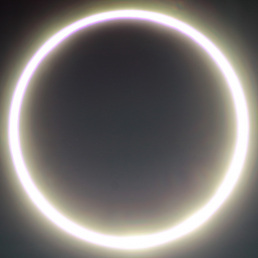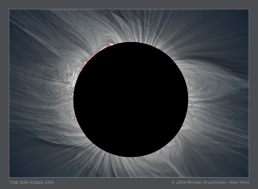Eclipse Soundscapes Apprentice Training
Lesson 4 - Eclipse Maximum by Eclipse Type
<<Previous Lesson 4 of 8 Next >>
Video Time: All (4:29) of this video will play for this lesson.
Two different solar eclipses will be happening in the US soon! There will be an annular eclipse on October 14, 2023 and a total solar eclipse on April 8, 2024. Because these are different kinds of solar eclipses, what you experience will be a little different.
ANNULAR ECLIPSE


Maximum Phase - Annularity
The maximum phase of the annular eclipse is annularity. Annularity is when the Moon blocks the center of the Sun from view. Eclipses can take hours, but annularity only lasts for less than a minute or as long as twelve minutes. During annularity, the Moon blocks the center of the Sun from view. This makes the Sun look like a “ring of fire.” In fact, annular eclipses are often called “Ring of Fire” eclipses. If you want to look at annularity, you MUST protect eyes with special eclipse glasses because all of the Sun’s powerful rays are not blocked.
TOTAL SOLAR ECLIPSE


Maximum Phase - Totality
The maximum phase of the total solar eclipse is totality. Totality is when the Moon blocks the entire Sun. Eclipses can take hours, but totality only lasts 1-7 minutes. With the Moon blocking the entire Sun, you can see the Sun’s bright outer atmosphere called the corona, which is not usually visible. The Sun’s bright corona looks like soft flower petals surrounding the Moon. During Totality is the ONLY brief time that you can look at the Sun without special eclipse glasses because all of the Sun’s powerful rays are completely blocked.
ANNULAR & TOTAL SOLAR ECLIPSE SAFETY
For both annular and total eclipses, remember to protect your eyes using eclipse glasses or a solar filter. Go to Eclipse Safety Resources for more eclipse safety information and make sure to review the Apprentice Eclipse Safety Lesson too.
Vocabulary
annular eclipse – when the Moon passes directly in front of the Sun, but appears to be too small to completely cover the Sun
annularity – when the Moon blocks only the center of the Sun, leaving a ring of light visible during an annular eclipse. Annularity is the maximum phase of an annular solar eclipse.
corona – outer atmosphere of the Sun
maximum phase – the phase of an eclipse when the Moon is lined up with the Sun
total solar eclipse – when the Moon passes directly in front of the Sun completely blocking the Sun from view
totality – when the Moon blocks the entire Sun from view during a total solar eclipse. Totaility is the maximum phase of a total solar eclipse.
Discussion / Notes
Write, draw, or verbally discuss the answers to the following:
- What is annularity?
- What is totality?